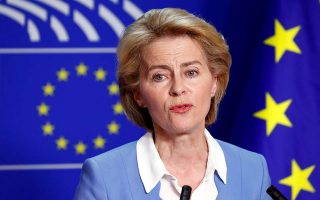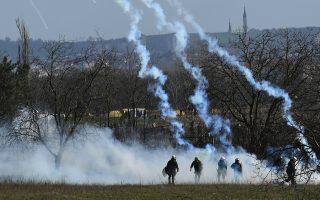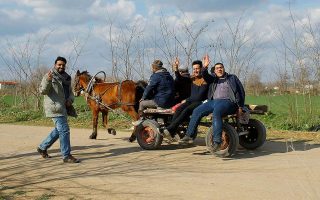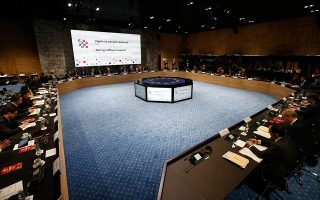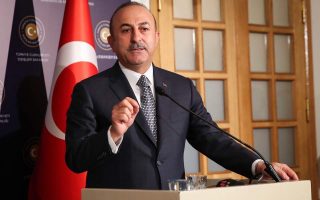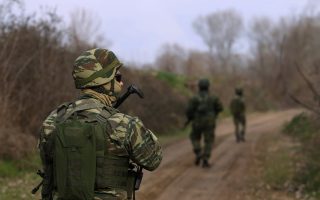Turkey, EU to hold talks amid standoff over migrants
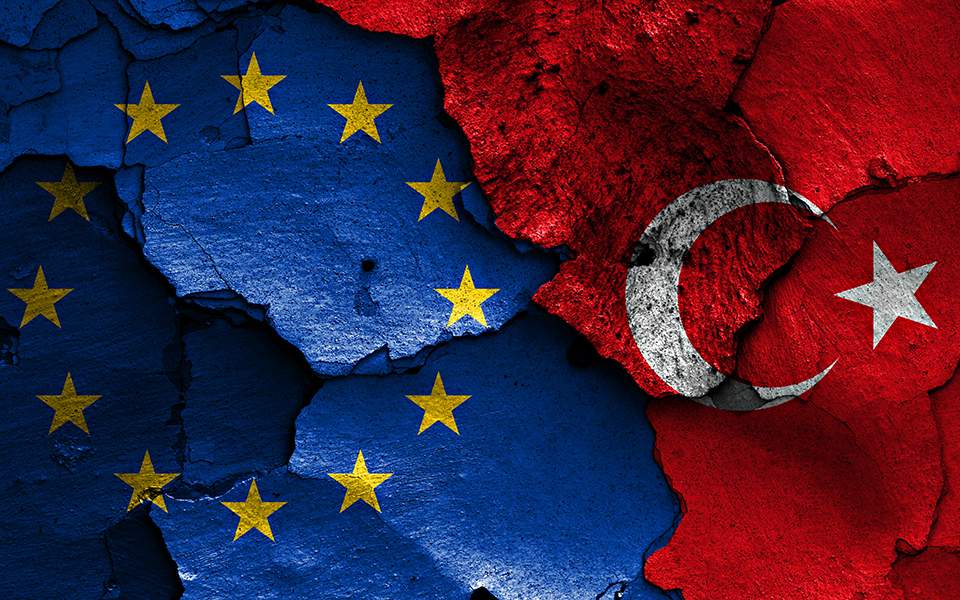
Turkish President Recep Tayyip Erdogan will visit Brussels on Monday for talks with European Union officials amid a standoff between Ankara and Brussels over sharing of responsibility for refugees and other migrants.
Thousands of migrants have massed at Turkey's land border with EU-member Greece after Erdogan's government made good on a long-standing threat and announced it would no longer prevent migrants from crossing into EU countries.
Turkey hosts more than 3.5 million Syrian refugees, and Erdogan has demanded that Europe shoulder more of the burden of caring for them.
He accused the EU of not meeting its obligations, including failing to pay money promised to Turkey under a 2016 deal to stem the flow of migrants to Europe. The EU says it is disbursing the funds.
The Turkish leader is to meet with European Council President Charles Michel and European Commission President Ursula von der Leyen to discuss the 2016 deal. Erdogan will also meet NATO chief Jens Stoltenberg, his office said.
The 2016 deal called for Turkey to halt the flow of Europe-bound migrants and refugees in exchange for up to 6 billion euros ($6.7 billion) in aid for Syrian refugees on its territory, fast-track EU membership and visa-free travel to Europe for Turkish citizens.
A high-level Turkish official, speaking on condition of anonymity in line with government rules, said the sides would discuss a possible revision of the agreement. It wasn't clear if a deal would emerge Monday.
Von der Leyen said the meeting would be the "restart of a dialogue." She repeated the EU has the obligation to protect its borders, but also to guarantee the fundamental individual right for asylum.
Topics will include regional stability, reducing tensions and pressure at the Greece-Turkey border, and Syria, she said.
Erdogan was also expected to raise concerns over alleged violence carried out by Greek authorities as they push migrants back to Turkey.
Greece has deployed riot police and border guards to repel people trying to enter the country and the Greek border area has since seen violent confrontations. On Saturday, youths threw rocks at Greek police and tried to pull down a border fence.
Many migrants have alleged mistreatment at the hands of Greek police, and Turkey says two migrants were killed in violence along the border. Greece has denied the accusations.
EU foreign ministers have criticized Turkey, saying it is using migrants' desperation for political purposes. EU countries are still dealing with the political fallout from a wave of mass migration five years ago.
Tens of thousands of migrants were already in Greece before Turkey announced its borders open, many of them in massively overcrowded camps on Greek islands facing the Turkish coast. Part of the 2016 EU-Turkey deal stipulates new arrivals must remain on the islands pending deportation unless they successfully apply for asylum in Greece.
Germany's coalition government said early Monday the country was willing to "support Greece regarding the difficult humanitarian situation of about 1,000 to 1,500 children on the Greek islands."
The government said Germany could host children in dire need of medical treatment or those who are unattended minors younger than 14, especially girls. It didn't say exactly how many children Germany would take, but said an agreement would be negotiated by a European "coalition of the willing" in coming days.
Greek Prime Minister Kyriakos Mitsotakis, meanwhile, welcomed Erdogan's visit to Brussels, saying he hoped it would mark "the start of the de-escalation of the crisis."
Speaking in Berlin, where he also met with German Chancellor Angela Merkel, Mitsotakis said "there must be a concrete change in Ankara's policy" if Turkey is to become an ally of the EU in the migration issue once more.
The first step, he said, would be for Erdogan "to immediately withdraw the desperate people he gathered" on the border and to accept back those caught having entered Greece illegally.
There have been no reports of migrants massing at Turkey's other EU border, with Bulgaria.
"Greece has always …. recognized and does recognize that Turkey has a crucial role to play in the management of the migration problem. And it needs Europe's help to do it," Mitsotakis said. "But this cannot happen … under conditions of threats and blackmail, using desperate people as pawns."
Merkel said Greece "deserves our full solidarity and our full support."
The German leader conceded that Turkey bears a "great burden" with its huge refugee population, but added that Ankara "can expect no understanding if it tries to solve its own problems on the back of refugees who then get stranded in a dead end at the Turkish-Greek border."
"This approach is unacceptable, and so I strongly advocate the EU-Turkey agreement being taken into a new phase," which will be discussed at Monday's meeting in Brussels, she said.
"It is very important that this meeting is taking place this evening, and it also has been well prepared in many ways in many telephone calls," Merkel said.
The situation on the Greek-Turkish land border was generally calm Monday. Greek authorities said in the 24 hours to Monday morning, they had blocked 1,646 attempts to cross the border and arrested two people — one Moroccan and one Egyptian.
[AP]
